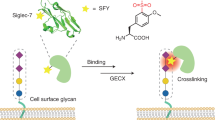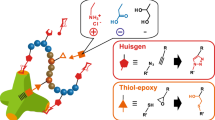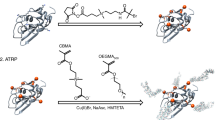Abstract
WE have reported a method for transforming polysaccharides into reactive derivatives useful for coupling proteins to carbohydrates1 which consists in treating the polysaccharide with cyanogen halide. Imino carbonic acid esters are probably formed and these react with the primary amino groups of proteins and other substances. This method of activation and coupling is gentle and therefore particularly useful for the production of immunosorbents and insoluble enzymes.
This is a preview of subscription content, access via your institution
Access options
Subscribe to this journal
Receive 51 print issues and online access
$199.00 per year
only $3.90 per issue
Buy this article
- Purchase on Springer Link
- Instant access to full article PDF
Prices may be subject to local taxes which are calculated during checkout
Similar content being viewed by others
References
Axén, R., Porath, J., and Ernback, S., Nature, 214, 1302 (1967).
Hjertén, S., Biochim. Biophys. Acta, 79, 393 (1964).
Bergmeyer, H., Methods of Enzymatic Analysis (Academic Press, New York and London, 1963).
Author information
Authors and Affiliations
Rights and permissions
About this article
Cite this article
PORATH, J., AXÉN, R. & ERNBACK, S. Chemical Coupling of Proteins to Agarose. Nature 215, 1491–1492 (1967). https://doi.org/10.1038/2151491a0
Received:
Issue Date:
DOI: https://doi.org/10.1038/2151491a0
This article is cited by
-
A detergent-based procedure for the preparation of IgG-like bispecific antibodies in high yield
Scientific Reports (2016)
-
Bioaffinity Based Oriented Immobilization of Stem Bromelain
Biotechnology Letters (2006)
-
Staphylococcus aureus Cowan I-induced human immunoglobulin responses: Preferential IgM rheumatoid factor production and VH3 mRNA expression by protein A-binding B cells
Journal of Clinical Immunology (1995)
Comments
By submitting a comment you agree to abide by our Terms and Community Guidelines. If you find something abusive or that does not comply with our terms or guidelines please flag it as inappropriate.



